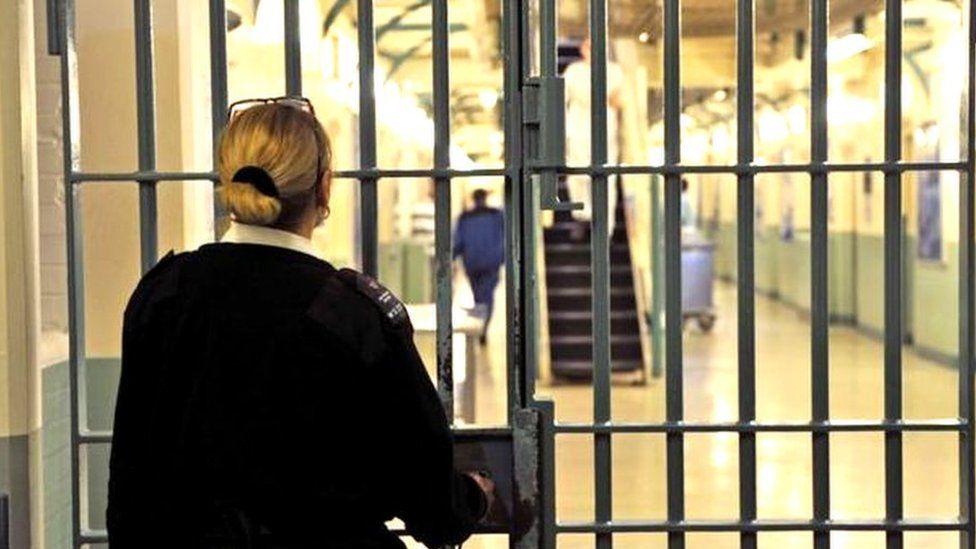Prisoners could be released up to 70 days early to ease overcrowding
- Published

Some prisoners will be freed up to 70 days early, after a scheme aimed at tackling overcrowding in jails in England and Wales was extended.
The scheme was introduced last October, at the time allowing for release up to 18 days early, with this increased to up to 60 days in March.
Justice Minister Edward Argar said only offenders near release are considered.
But Labour claimed the early release scheme is the price the public pays for a justice system in "crisis".
Anyone convicted of a sexual, terrorist or serious violent offence is excluded.
Shadow justice secretary Shabana Mahmood tabled an urgent question on the issue in Parliament, after there was no formal announcement on the extension, first revealed by the Times, external.
Addressing MPs, Justice Minister Edward Argar said: "Many members of this house would be concerned about early release of offenders into the community, but let me be clear that only offenders who would soon be released anyway would be considered."
He added public safety "will always be our number one priority" and all those released would be subject to supervision.
Domestic abuse commissioner for England and Wales Nicole Jacobs said "there has been no consultation" about the changes and "victims' groups were not even made aware" before their introduction.
And Labour accused the government of extending the early release scheme - formally called the End of Custody Supervised Licence (ECSL) - in secret.
"Never in this country has a government ever been forced to release prisoners over two months early," Ms Mahmood told MPs.
Questioning the minister, she asked why the scheme had been increased to 70 days, how many prisoners had been released under the wider scheme and if probation would be given time to assess risk.
Mr Argar answered it was an "appropriate operational decision" to ensure courts have spaces to send people to prison.
Ministers have previously said the scheme was "targeted" and "operating in prisons as required and where necessary".
The change will take effect from 23 May.
'Simply isn't enough space'
Ms Jacobs said perpetrators of domestic abuse "frequently receive short prison sentences" and were "likely to be among those released early".
"The government needs a safe and planned approach. Instead they are letting potentially dangerous perpetrators out earlier and earlier with little oversight or evaluation of the scheme," she said.
"We need a specific exemption of perpetrators of domestic abuse and stalking."
The prison population has ballooned in recent decades as a result of tougher sentences and court backlogs.
At the beginning of this month the prison population stood at 87,505, with the total usable capacity at 88,895.
The figure is up from 84,772 a year ago, while capacity has increased by around 3,000 places.
Chief inspector of prisons Charlie Taylor said "there simply isn't enough space" despite "frantic" attempts to increase capacity with temporary accommodation and two new prisons.
"The number of places simply can't keep pace with the number of people coming in," he told Times Radio.
A Ministry of Justice spokesperson said: "We will always ensure there is enough capacity to keep dangerous offenders behind bars.
"We are carrying out the biggest prison expansion programme in a hundred years, opening up 20,000 modern places, and ramping up work to remove foreign national offenders."
The spokesperson said offenders would continue to be supervised under conditions such as tagging and curfews.
Related Topics
- Published12 March